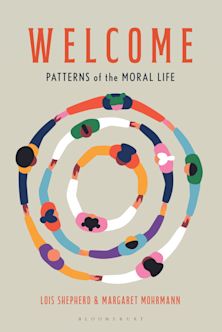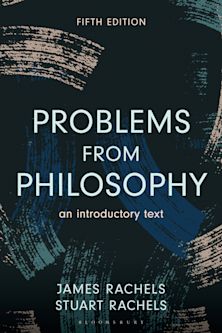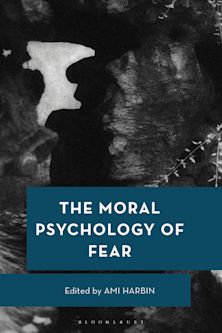- Home
- ACADEMIC
- Philosophy
- Ethics and Moral Philosophy
- Ethics Embodied
Ethics Embodied
Rethinking Selfhood through Continental, Japanese, and Feminist Philosophies
Ethics Embodied
Rethinking Selfhood through Continental, Japanese, and Feminist Philosophies
This product is usually dispatched within 3 days
- Delivery and returns info
-
Free US delivery on orders $35 or over
You must sign in to add this item to your wishlist. Please sign in or create an account
Description
While the body has been largely neglected in much of traditional Western philosophy, there is a rich tradition of Japanese philosophy in which this is not the case. Ethics Embodied explains how Japanese philosophy includes the body as an integral part of selfhood and ethics and shows how it provides an alternative and challenge to the traditional Western philosophical view of self and ethics. Through a comparative feminist approach, the book articulates the striking similarities that exist between certain strands of Japanese philosophy and feminist philosophy concerning selfhood, ethics and the body. Despite the similarities, McCarthy argues that there are significant differences between these philosophies and that each reveals important limitations of the other. Thus, the book urges a view of ethical embodied selfhood that goes beyond where each of these views leaves us when considered in isolation.
With keen analysis and constructive comparison, this book will be accessible for students and scholars familiar with the Western philosophical tradition, while still adding a more global perspective.
Table of Contents
Part 2 Part 1 - A Heuristic Framework
Part 3 Part 2 - Outline of the Book
Chapter 4 Chapter 2 - Towards a New Ethical Framework: Watsuji in Dialogue with the West
Part 5 Part 1 - Ethics and the Human Being as Ningen
Part 6 Part 2 - Heidegger: "the Solitary Self"
Part 7 Part 3 - Husserl: Moving Towards a Relational Self
Chapter 8 Chapter 3 - The Embodied Self
Part 9 Part 1 - Husserl and the Body
Part 10 Part 2 - Body East and West
Part 11 Part 3 - Ningen, Ethics, and the Body
Part 12 Part 4 - Yuasa's Theory of the Body
Chapter 13 Chapter 4 - Towards an Embodied Ethics of Care
Part 14 Part 1 - Care Ethics: East and West
Part 15 Part 2 - Care Ethics and the Body
Part 16 Part 3 - Reciprocity
Part 17 Part 4 - Global Care Ethics
Chapter 18 Chapter 5 - Body, Self and Ethics: Watsuji and Irigaray
Part 19 Part 1 - Subjects in Betweenness
Part 20 Part 2 - Bodies in Betweenness
Part 21 Part 3 - Between and Beyond Watsuji and Irigaray
Chapter 22 Chapter 6 - Conclusion
Product details
| Published | Aug 11 2011 |
|---|---|
| Format | Paperback |
| Edition | 1st |
| Extent | 134 |
| ISBN | 9780739120507 |
| Imprint | Lexington Books |
| Dimensions | 9 x 6 inches |
| Publisher | Bloomsbury Publishing |
About the contributors
Reviews
-
McCarthy writes with a clarity that shows how deeply she has thought about, and cared about, the encounter of Western feminist thinking with Japanese philosophy. Not only has she made difficult texts accessible to the general reader, she has succeeded in making them relevant to an important range of contemporary ethical questions. This little book represents yet another landmark in the opening of Western philosophy to the remarkable insight of an intellectual tradition whose contributions to discussions of the body are irreplaceable.
James W. Heisig, Nanzan Institute for Religion and Culture
-
A fascinating study of some important intersections between phenomenology, modern Japanese philosophy, and contemporary feminist ethics. By bringing these streams of thought together to re-assess embodiment and its significance for ethics, McCarthy simultaneously develops a novel form of cross-cultural feminist philosophy.
Alison Stone, Professor of European Philosophy, Lancaster University
-
Ethics Embodied is, as the author notes, an introduction, but it also attempts to carve out a new approach to ethics and offers as well a re-thinking of what is essential in teaching at all levels. As an introduction, it succeeds admirably and should create considerable excitement in the minds and bodies of readers.
Robert Carter, Trent University
-
McCarthy builds a strong case for undertaking a crosscultural, interdisciplinary dialogue across the Continental, Japanese, and Feminist philosophical traditions. After a lucid and careful explanation of the Japanese concept of the self (ningen, as found in Watsuji’s philosophy), which partakes simultaneously of the individual and the social as well as the spatial and the temporal, McCarthy builds a robust comparative analysis of these three traditions.
Religious Studies Review


































